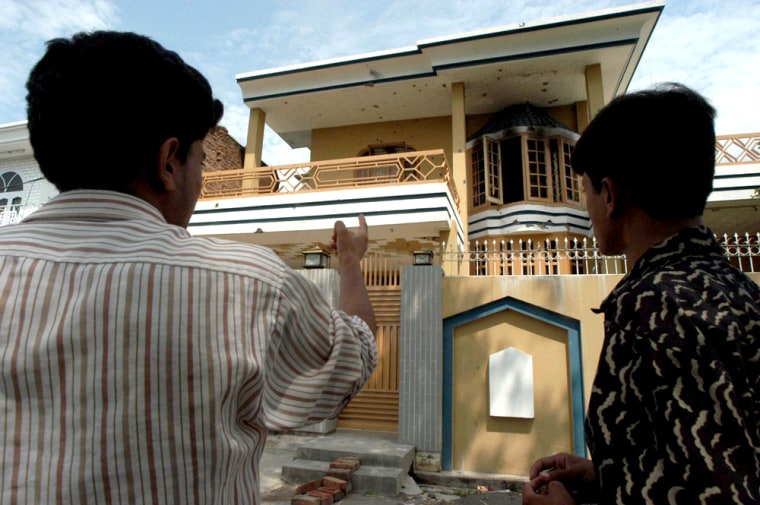The arrest of a senior al Qaeda operative in June and his subsequent interrogation enabled U.S. and Pakistani intelligence agents to gather documents, e-mail addresses and cell phone text messages that suggested al Qaeda planned to strike targets in New York and Washington, according to Pakistani intelligence officials.
The al Qaeda operative, Musaad Aruchi, was arrested here on June 12 by Pakistani paramilitary forces in an operation supervised by the CIA, officials said. According to a senior Pakistani intelligence official involved in the early interrogation of the suspect, Aruchi "was sure that al Qaeda would hit New York or Washington pretty soon."
"He had with him street maps of New York City without the front cover, and addresses of some other important buildings," the official said. "There were some data CDs also recovered from him."
Pakistani officials said Aruchi's capture had led to other important arrests, including the raid last week in the city of Gujrat that netted Ahmed Khalfan Ghailani, a Tanzanian wanted in connection with the 1998 bombings of U.S. embassies in Kenya and Tanzania.
"The Americans always thought that Aruchi was a big catch because of his connection with other active al Qaeda operatives, particularly those planning to target the U.S.," another Pakistani intelligence official said.
Officials described Aruchi as a nephew of Khalid Sheik Mohammad, the chief planner of the Sept. 11, 2001, attacks on the World Trade Center and the Pentagon, who was arrested in the Pakistani city of Rawalpindi in March 2003. Like Mohammad, Aruchi was born in Pakistan's Baluchistan province, but his parents later moved to Kuwait and subsequently to other Persian Gulf states.
Officials said Aruchi is also a cousin of Ramzi Ahmed Yousef, who planned and carried out an attack on the World Trade Center in 1993 and is serving a life sentence in the United States.
"It seems that this family has something in their genes against the icons of financial power in the U.S.," one Pakistani intelligence official said.
A foot soldier
U.S. intelligence telephone and Internet intercepts enabled investigators to trace Aruchi to an apartment building in a congested Karachi neighborhood, other officials said.
Pakistani authorities held him for three days before he was flown in an unmarked CIA plane from a Pakistani air force base to a location that U.S. officials did not disclose to the Pakistanis, intelligence officials said. One official said the casual nature of Aruchi's remarks during his brief time in Pakistani custody provided hints that the al Qaeda operative was in touch with people planning another terrorist strike in the United States.
Intelligence gathered from Aruchi also led to two important arrests last month, another Pakistani official said.
Muhammad Naeem Noor Khan, a Pakistani, was arrested in the city of Lahore on July 13. A Pakistani official familiar with Khan's interrogation said, "Khan did some messaging for some of his Arab associates he knew from his days in Afghanistan. We can't categorize him as a key player, but he was definitely a foot soldier.
"Nothing very incriminating was found to connect him with any terrorist act or to the planning of an act, hence we are still not sure if he'll be prosecuted or not," the official said.
Information obtained from Khan, when compared with extensive debriefing of Aruchi, led U.S. and Pakistani officials to Ghailani, the Tanzanian whose arrest in Gujrat last week has been described by Pakistani and U.S. officials as a major breakthrough.
"The timing of [Ghailani's] arrest is superb. He was definitely working on something big," said a Pakistani official familiar with his initial interrogation in Pakistan.
As Pakistani officials prepared Sunday night for Ghailani's apparently imminent handover to U.S. authorities, they said they were sure that computer disks found in his possession -- one in his laptop and another loose -- might reveal at least some of al Qaeda's plans and clues about important operatives.
The officials said that two other suspects arrested with Ghailani, earlier thought to be insignificant, had provided information showing that Ghailani was expecting important news from the United States.
Training courses with FBI, CIA
Pakistani and U.S. officials are still trying to establish the nationalities of the two suspects.
An al Qaeda operative captured several weeks ago by Pakistani security forces, Abu Talaha, was described as one of the key sources of the documentary information on surveillance in the United States, according to a senior American intelligence official. Talaha remains in Pakistani custody, the official said.
Under procedures agreed to by the U.S. and Pakistani governments, agents from the CIA, FBI and National Security Agency have been allowed to eavesdrop and conduct wiretaps on terrorism suspects in Pakistan, a cabinet minister said on condition of anonymity.
For its part, the Inter-Services Intelligence agency, or ISI, Pakistan's military intelligence service, has designated special units to collect counterterrorism intelligence through hundreds of newly recruited agents and state-of-the art surveillance equipment provided by the U.S. government.
"There is almost daily exchange of information between the CIA and ISI. The cooperation is even better than the Afghan war days," said the minister.
Pakistani police and intelligence officials said that once a target is tracked down, any raid is always conducted by local law enforcement agencies under the direct supervision of senior ISI officials, many of whom have taken training courses with the FBI and the CIA.
All key al Qaeda suspects arrested in Pakistan have been handed over to U.S. authorities for broader investigation. In each case, Pakistani intelligence officials were called in by their U.S. counterparts for coordinated follow-up.
"There is not a single significant al Qaeda arrest that didn't yield us more," a senior Pakistani intelligence official said of Aruchi.
